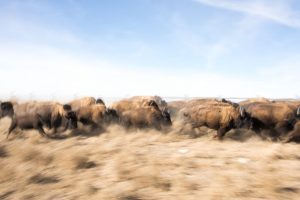
SAN LUIS VALLEY-
The Medano-Zapata Ranch is bustling. Bison huddle as they wait to be led into a shoot that will allow ranchers to examine them closely. It’s the one time of year when ranchers round up their herd to pull heads for sale, administer vaccination and health checks. Bison have roamed the San Luis Valley for thousands of years and are as natural to the landscape as the mountains.
But this operation is also devoted to taking care of the semi-arid land.
“There’s a mission much bigger than ranching, we’re trying to save the world, you know, start a revolution,” Phillips III said.
The ranch is owned by the Nature Conservancy. Phillips and crew are in partnership with the Nature Conservancy to produce bison as close to what an ancient herd of bison would’ve been. They manage the bison in a way that avoids damage and even improves the land. The ranch’s reliance on tradition is juxtaposed with a highly modern operation.
Instead of rounding up the bison on horseback, this year, the ranch rented a helicopter to cover the 100,000 acre expanse. The ranchers themselves are a modern installment too. Duke Phillips III is in charge of operations and he is assisted by his son Duke Phillips IV. They’ve assembled a crew of ranch workers, who aren’t the grizzled cowboys one might expect to see round up of these prehistoric beasts. Today’s ranch hands are young, many are female, and almost all had no prior experience of ranching.
For example, Meredith Barrett works at Monte Prieto Ranch in New Mexico which is also managed by the Phillips family. She said she got into ranching because it aligned her goals of conservation and environmentalism.
Phillips III said he thinks the ranch’s mission of land conservation is what attracts so many young people to work there.
“Ranchers have to see themselves as conservationist and environmentalist.”
Phillips conservation mindset is exactly what agriculture in the San Luis Valley needs. Climate change, new water use policies and regulations, and a new generation that may not want to continue in traditional livelihoods create challenges for the future of agriculture.
Ranchlands, manages ranches owned by the Phillips and views economics as going hand in hand with conservation. They have diversified their operations to include agri-tourism, which allows people to stay on the ranch and essentially live life as a ranch hand for their vacation. By allowing people to visit and interact with the ranch, Phillips said he hopes to foster a greater connection to their food and understand the role ranching plays in protecting the ecosystem and wildlife.
Bridging the gap between the rural and urban will be essential to achieving his goal of conservation
“It’s just as much about the people as it’s about the land.”
Phillips eagerly shares his life’s work because he feels careful land management is an important and necessary service.
“We love it. We were born into it. To me, It’s an honor to take care of the landscape.”
The ranch workers laugh and joke as they direct the bison into the shoot. With young farmers straying away from their family’s traditional livelihood, enthusiastic conservationist are stepping up to be America’s next farmers.
Phillips wanders around to check in with his team members and recount the day’s events.
“Hopefully I’ll leave this land in a better place,” Phillips said as he looked over his Bison and team slightly nodding and smiling.

